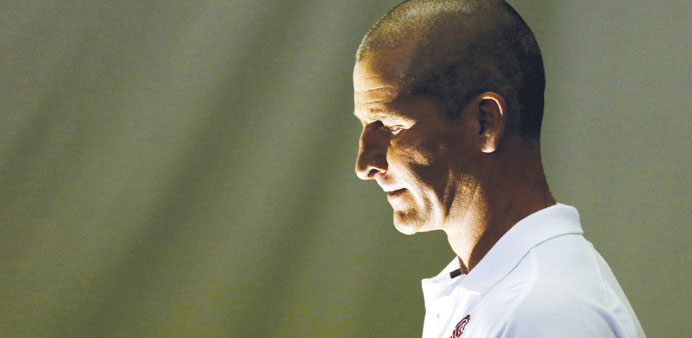By Owen Gibson
The Guardian
A devastated Stuart Lancaster has admitted, amid increasing speculation over his position, that he will never get over England’s crushing early elimination from the Rugby World Cup.
As the Rugby Football Union’s chief executive, Ian Ritchie, announced a “360-degree” review to take place after the World Cup that could lead to Lancaster and his staff being sacked or redeployed, the head coach said his emotions were too raw to consider his own future.
“I don’t think I’ll ever come to terms with it, personally, because it was such a big thing. As a coach I’ve had some great moments coaching England and I’ve had some disappointing ones but this pales everything else into insignificance because of what the tournament means to everyone,” he said in the wake of England’s 33-13 dismantling by Australia.
“That’ll be the overriding emotion I’ll have for a long time, I think. I need some time, obviously Ian needs some time and the RFU does as well. I think we’ll make the right decision at the right time.”
Lancaster, widely praised for rebuilding passion in the England shirt and reconnecting the public in the wake of the controversies that plagued the 2011 World Cup side, faces big questions over his team selections and the fact his players have habitually fallen at their biggest hurdles.
By picking Sam Burgess at centre for the Wales game and dropping George Ford for Owen Farrell after the opening win over Fiji, Lancaster risked sparking division within the camp. He has also faced questions from inside and outside the set-up over his management style. “At the end of the day, I’m the head coach and we didn’t get out of the pool. It’s stating the obvious. It’s going to sit with us all forever - players, coaches, management,” a shaken Lancaster said.
But the coach was quick to reject suggestions that the defence coach, Andy Farrell, father of the fly-half Owen, was overly influential in terms of selection. Farrell’s future, along with that of the attacking skills coach, Mike Catt, and forwards coach, Graham Rowntree, is also in the balance. “Let’s put that one to bed to start with. The decisions we make on selection are collective and they’re ultimately mine and my responsibility,” he said.
The former England captain Will Carling was among those who said on Sunday change was necessary and that, even if Lancaster stayed on, as head coach then the team around him needs wholesale reform. One possible outcome of the looming review, which Ritchie said had no fixed timescale and would include input from the players, could be that Lancaster is given another job elsewhere within the RFU system but a new head coach is appointed.
Lancaster, who said his family and the wider fate of English rugby would be uppermost in his mind, said it was “far too soon” to say whether he would consider another role. But he reiterated his belief that the young England squad he had put together in the wake of the 2011 implosion under Martin Johnson, who between them had 450 caps compared to Australia’s 750, had better days ahead.
“I come back to the point about the player pathway and the talent coming through the programme. We have an unbelievable group of players. Twenty-four of them were in their first RWC, the majority will be around in 2019 if not 2023,” he said.
“There is a great England side in the making but the reality is we didn’t achieve it this time around and I’m ultimately responsible for that.”
Ritchie, the former All England Lawn Tennis Club chief executive who appointed Lancaster on a full-time basis in 2012, said he did not regret handing the head coach and his staff six-year contracts through to 2020 in advance of the tournament.
The contracts to 2020 are understood to include annual break clauses related to performance targets, which would limit the amount of compensation the RFU would have to pay to release staff.
Nor would he brook any criticism of the decision not to revisit the eligibility rules that prevented England picking Steffon Armitage because he plays in France. And Ritchie said the review would not be analysing his own decision-making but would follow the template set by previous Six Nations reviews that he has led.
“What can we do to make it better? And find the right way of doing that. That’s what we’ll do. And it’ll involve whoever is appropriate and necessary and, as the chief executive, obviously I’ll be fully involved in that,” he said.
Pressed on whether the review panel would include any independent review of his own decisions, Ritchie said: “I think it’s appropriate that I will be heavily involved in that. I don’t think there’s anything above that.”
Ritchie said he didn’t yet “have a clue” what the review would look at but said he wanted to avoid the chaos and blood-letting that surrounded multiple reviews of the 2011 failure. “What we need to look at is the generality. Sustainable success is what we’re trying to build towards. Clearly that was not sustainable success,” he said.
A beaten and drawn Lancaster, the pain of England’s early exit etched on his face, identified letting slip a 10-point lead against Wales as the moment their chances of progress began to ebb away. “You look back and being 22-12 up in the Wales game 60 minutes in and then to not come away with a win really put us under pressure against Australia,” he said. “It was small margins and big consequences in a lot of the games.”
Ritchie said there was no set timescale for the review, although Lancaster may yet take the decision out of the RFU’s hands if he decides he can go no further in his current role. “Rightly, as Stuart said, 12 hours after the thing yesterday we don’t want to be rushing into anything,” said Ritchie.

